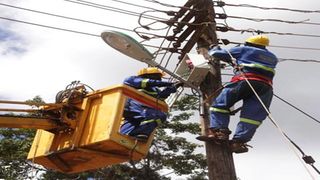
Kenya Power staff at work in Nyeri.
|Companies
Premium
Kenya Power now seeks higher electricity deposits
Postpaid electricity customers will pay more in electricity bills this month after utility firm Kenya Power’s decision to increase security deposits for this category of consumers.
Many such customers have received text messages informing them that security deposits had been increased and that they need to pay the additional charge in their next bill.
Kenya Power told the customers that they will need to pay Sh2,500 more because “your current deposit is insufficient to support your contract. Kindly pay the same together with your bill”.
The new charges affect existing and new customers and will increase the cost of getting connected to electricity and when relocating to a new house.
Sh2,500
Postpaid customers used to pay a security deposit of at least Sh2,500, an amount Kenya Power now says is inadequate to offset potential power bill defaults.
Kenya Power has been struggling with an ever increasing load of unpaid bills from retail and industrial customers and now wants to increase security deposits to lower the effect of defaults.
The firm was owed Sh29.66 billion in the year to June 2021, a Sh2.26 billion increase from Sh27.39 billion in the previous year.
It wrote off Sh15.88 billion in unpaid bills that it predicted it could not recover from defaulters, an increase from Sh15.49 billion the previous year.
It now relies on private debt collectors, who take a percentage of the money they manage to recover.
It has also aggressively rolled out prepaid meters to ensure customers use only the power they have paid for.
The company’s finance and risk committee cited unpaid bills as one of the biggest risks to its fiscal position.
Other risks include market ones such as changes in power demand, currency fluctuation, liquidity risks arising from rapid expansion of its network and a heavy debt load.
Kenya Power had hinted in its annual report that it would increase security deposits as a strategy for limiting its exposure to bill defaults.
Automatic metres
“The Company continues to install prepaid and automatic meters as strategies to minimise the risk of non-collection. This includes focus on early identification and letters of demand for higher security deposits,” it said.
Despite the rollout of prepaid meters, most of Kenya Power’s high-value users, including large manufacturers, are still on postpaid meters and pose the greatest risk of default.
The company sold electricity worth Sh20.57 billion through prepaid meters in the year to June 2021, up from Sh17.81 billion the previous year, while Sh105.34 billion was earned from postpaid meters.
The outstanding electricity bills fell for the first time in five years in the results for the six months to December 2021, giving it a significant financial boost.
Overdue customer debt recorded a reduction of Sh900 million. The firm attributed this to enhanced field presence and government intervention with state agencies.





